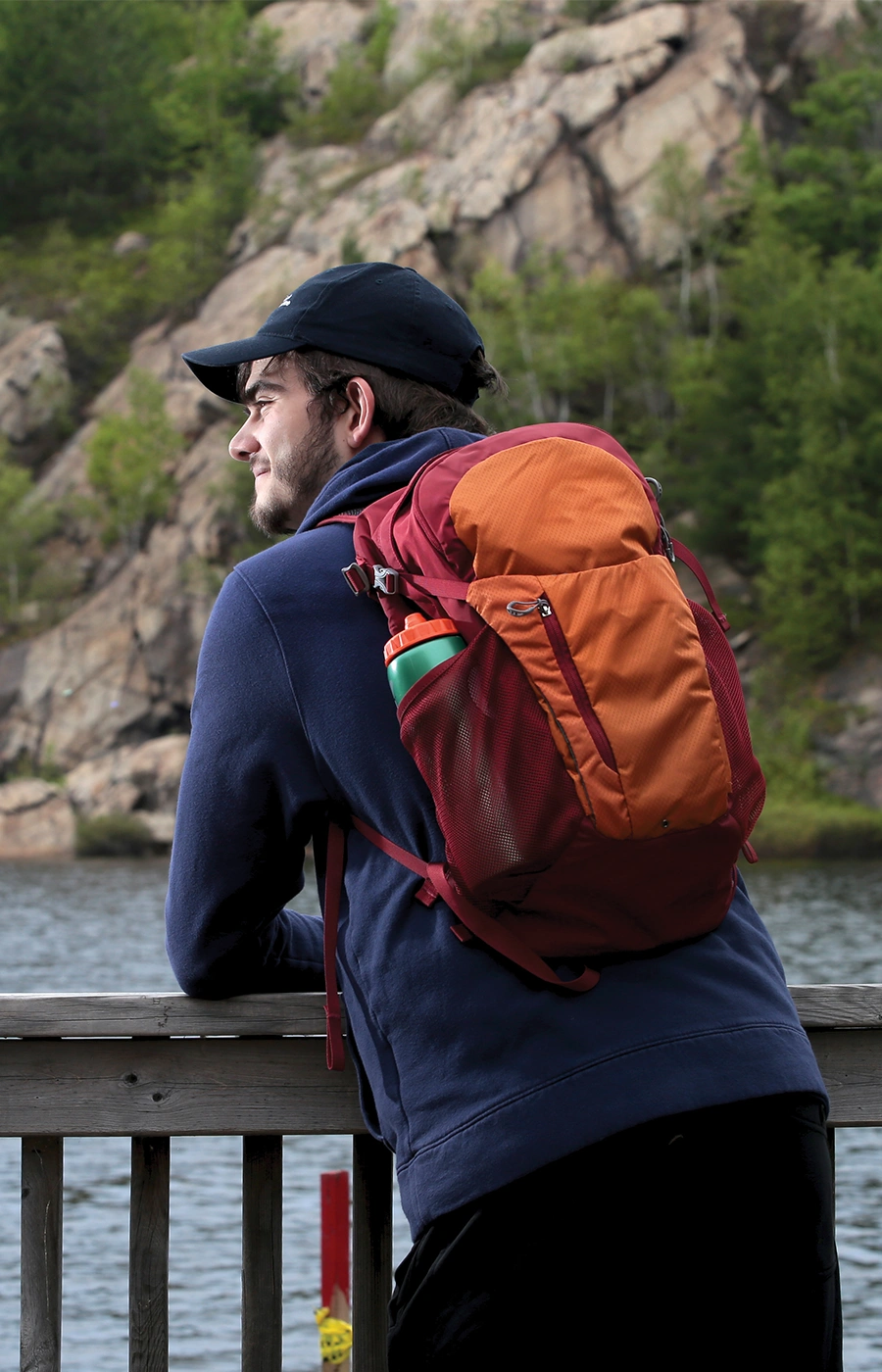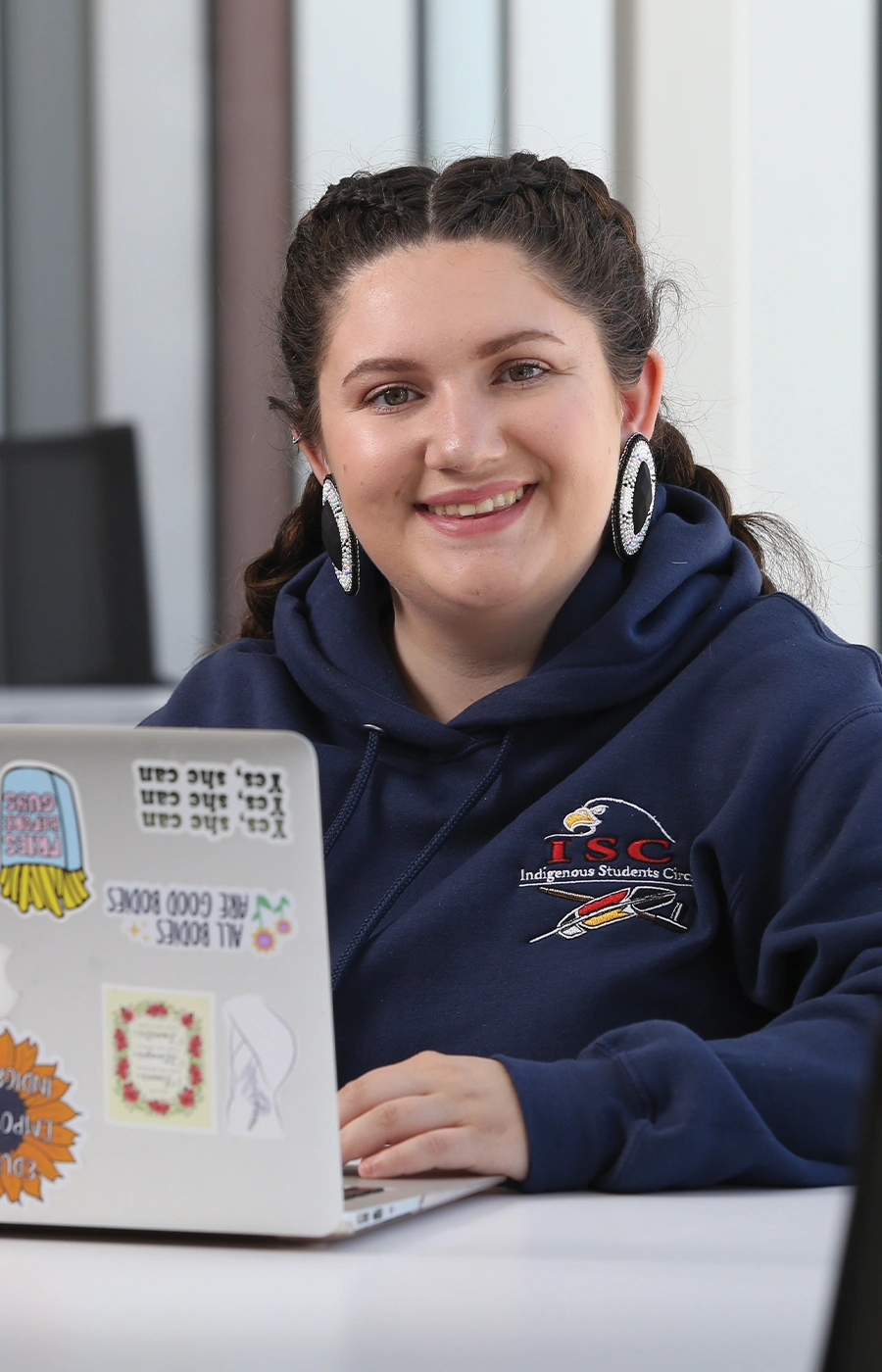
Indigenous Relations (MIR)
Faculté d'éducation et de la santé

Survol du programme
Apportez vos connaissances et compétences aux communautés autochtones à l’échelle locale, nationale et internationale.
Remarque : Ce programme est offert uniquement en anglais. Pour en savoir plus sur ce programme, veuillez consulter la version anglaise de cette page.
Préparez la maîtrise en relations autochtones à l’Université Laurentienne et développez une meilleure compréhension des enjeux auxquels font face les populations des Premières Nations, des Métis et des Inuits du Canada. Apprenez à établir efficacement des relations avec les communautés autochtones à mesure qu’elles continuent de s’élargir et de croître.
Le programme allie des cours avec une recherche et une soutenance de thèse. Vous étudierez les relations historiques et actuelles entre les sociétés autochtones et allochtones. Vous découvrirez également la culture autochtone en étudiant la littérature, les droits de la personne, la politique, l’écologie et la gouvernance. Ce programme souple est offert à plein temps et à temps partiel, les cours étant donnés sur le campus et selon un format hybride.
Grâce à la nature du programme, vous aurez la possibilité de faire reculer les limites disciplinaires, vous permettant d’adapter votre recherche et votre projet spécial en développement communautaire autochtone selon vos intérêts (p. ex., services sociaux pour les Autochtones, soins infirmiers, études autochtones, éducation et langue, géographie, exploitation minière, etc.).
Une fois le programme terminé, vous recevrez le diplôme de Master of Indigenous Relations et aurez acquis les connaissances et la perspicacité nécessaires pour susciter des changements percutants dans divers domaines. Vous serez en mesure de préparer en toute confiance des propositions de recherche et des politiques dans les domaines social, politique, environnemental et de la santé avec une compréhension approfondie de la perspective autochtone.
Remarque : Un membre du corps professoral doit avoir accepté de diriger votre thèse de recherche dès votre admission au programme. Pour prendre ces dispositions, veuillez consulter sur cette page la section Membres du corps professoral – Direction de thèse de recherche.
Profitez du soutien et des connaissances des membres du corps professoral de l’École des relations autochtones ainsi que d’autres facultés, départements et disciplines du campus.
La situation géographique inégalée du programme offre une expérience exceptionnelle d’étudier et de travailler dans les communautés autochtones du nord de l’Ontario.
Ce programme d’études supérieures autochtones sans pareil est offert aux étudiants de tous les horizons culturels. Il met un accent particulier sur la compétence biculturelle permettant de travailler au sein de tous les organismes sociaux et politiques canadiens dans tous les champs d’exercice.
Perspectives de carrière
Les diplômés auront l’esprit tranquille sachant qu’il existe de nombreux choix de carrière à explorer après l’obtention du diplôme. Parmi les domaines de carrière, il faut souligner :
- Administration
- Développement communautaire
- Éducation
- Santé
- Élaboration de politiques
- Recherche et développement
- Formation et gestion
Il y a également de nombreuses carrières dans les organismes autochtones et politiques mondiaux telles que les Nations Unies.
Détails du programme
Langue du programme:
Français
Mode de présentation:
Hybride
Coordonnées
Taima Moeke-Pickering, Ph.D., coordonnatrice de MIR(705) 675-1151, poste 5083
tmoekepickering@laurentienne.ca
Veuillez écrire à l’adresse courriel ci-dessus et notre équipe de recrutement vous répondra!
En savoir plus sur le programme
Remarque : Ce programme est offert sur place et dans un format hybride (sur place et en ligne).
Exigences d’admission
Pour en savoir plus sur les conditions d'admission au programme, veuillez consultez la section « Admission Requirements » sur la version anglaise de cette page.
Comment déposer une demande
Pour faire une demande aux études supérieures, vous devez déposer votre demande d’admission auprès du Centre de demande d'admission aux universités de l'Ontario (CDAUO).
Pour obtenir des instructions détaillées sur le processus de demande d'admission, veuillez consulter les pages suivantes :
- Comment déposer une demande : Candidats canadiens aux cycles supérieurs
- Comment déposer une demande : Candidats internationaux aux cycles supérieurs
Déposer une demande en tant que candidat aux cycles supérieurs
Exemples de cours
Pour voir les cours offerts par ce programme, veuillez consulter la section « Courses » sur la version anglaise de cette page.
This course sets the framework for understanding Indigenous research methodologies in relation to Indigenous worldviews, theory and practice. Critical perspectives on the methods and approaches used in the study of Indigenous peoples are examined as well as the political, economic, cultural and social issues involved in conducting research with Indigenous communities. (lec 3) cr 3
This course critically analyzes various methodologies including qualitative, quantitative, and Indigenous approaches for relevance to the advancement of Indigenous societies. Relationships among epistemology, ideology and research methods are also examined.
This course examines how Indigenous and non-Indigenous people interact with Mother Earth (Shkagamik-Kwe). The concept of natural resources analyzed from the Anishnaabe/Indigenous understanding as well as Western paradigms. Case studies are used to examine various issues regarding natural resources, climate change, forest sustainability, management of protected areas and parks, and mining exploitation and environmental healing. An understanding of sharing will be analyzed and understood from the Medicine Wheel, Seven Grand Father and Ancestral teachings. Pre-req : MIRE 5006 and MIRE 5016.
This course examines styles of interaction at the verbal and non-verbal levels as well as analyzing forms of communication that come into play in Indigenous community development and organizational contexts. Topics include: culturally sensitive communication differences and successful interactions with people from other cultures. An understanding of community relationships will be analyzed and understood from the Medicine Wheel, Seven Grandfather and Ancestral teachings. PREREQ: MIRE 5006 and MIRE 5016. 3 cr.
This course provides an understanding of International Indigenous issues associated with the United Nations and Country policies with respect to Indigenous peoples. Topics include: an examination of Human Rights Conventions; the United Nation system; the role of NGOs (Non-Governmental Organizations); State Country reporting; and Indigenous actions toward legal, economic, political and International strategies. The strategies and politics of human rights, Indigenous rights,distinctive juridical customs, International cooperation and the role of foreign assistance programs are also analyzed. PREREQ : MIRE 5006 and MIRE 5016. (lecture 3 hrs) cr 3
This course entails a project on a special topic in Indigenous community development. A position paper is conducted with a community in consultation with a faculty supervisor. PREREQ: MIRE 5006 and MIRE 5016. cr 3
Under the guidance of a faculty supervisor the student completes a thesis based on a proposal he/she has developed. Pre-req [All CORE courses of the MIR] cr 12
Membres du corps professoral
DIRECTION DE THÈSE DE RECHERCHE
- Adria Kurchina-Tyson, École des relations autochtones
- Daniel Côté, Ph.D., École des relations autochtones
- Darrell Manitowabi, Ph.D., professeur de l’EMNO
- Elizabeth Wenghofer, Ph.D., École de kinésiologie et des sciences de la santé
- Jeffrey Wood, Ph.D., School of Education
- Jennifer Johnson, Ph.D., doyenne de la Faculté des arts
- Joey-Lynn Wabie, Ph.D., École des relations autochtones
- Jorge Virchez, Ph.D., professeur émérite
- Kevin Fitzmaurice, Ph.D., professeur associé
- Lorilee McGregor, Ph.D., professeure de l’EMNO
- Lynne Gouliquer, Ph.D., professeure agrégée
- Marion Maar, Ph.D., professeure de l’EMNO
- Nancy Lightfoot, Ph.D., École de kinésiologie et des sciences de la santé
- Stephen Ritchie, Ph.D., École de kinésiologie et des sciences de la santé
- Susan Manitowabi, Ph.D., École des relations autochtones
- Taima Moeke-Pickering, Ph.D., École des relations autochtones
- Nicole Wemigwans, École des relations autochtones
COMITÉ DE MIR
- Taima Moeke-Pickering, Ph.D.
- Joey-Lynn Wabie, Ph.D.
- Jeffrey Wood, Ph.D.
- Adria Kurchison-Tyson
- Daniel Côté, Ph.D.
- Sharlene Webkamigad
Prêt(e) à passer à la prochaine étape?
Nous sommes là pour vous aider à commencer votre parcours à Laurentienne.



